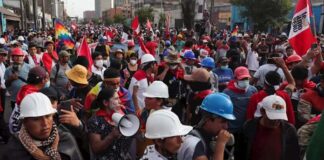Paula Pfoeffer in Cochabamba, Bolivia, reports that the Morales government in Bolivia has been under attack by right-wing forces.
Authors note: I have had a number of semantic discussions with Bolivians and foreigners living in Bolivia about whether or not the groups initiating the violence in Santa Cruz are fascist or not. I am not going to get into this argument, the fact remains that most of the social movements in Bolivia are fighting fascism in Santa Cruz and I feel that unless the international community starts calling this movement for what it is, the gravity of what is unfolding in Bolivia will not be understood completely. Therefore in this article when I refer to fascist groups, I refer to all groups in opposition (including the Media Luna Governors) to the Morales government.
On Tuesday September 9, members of the youth arm of the Comite Civico in Santa Cruz, violently took over a number of government institutions, including the recently nationalised telephone company Entel and the office of Land Reform INRA. The following days saw a number of other institutions sacked and occupied, including SEDUCA (the education department) and most disturbingly, the office of CEJIS, an independent organisation which works with indigenous groups on land title issues. These attacks were not just confined to the city of Santa Cruz, in the city of Tarija, fascist groups attacked the Peasant Market, injuring dozens, whilst another members occupied gas fields. In the Pando region, 9 deaths resulted in battles between government supporters and fascist groups. At this stage 5 airports around the country are occupied and closed to incoming flights, including the International Airport in Santa Cruz.
International Response
The Morales government expelled the US Ambassador on Wednesday for adding and abetting the fascist groups. Whilst the US Government denies any involvement, it is important to consider previous US government involvement in Bolivian affairs. As Kathy Ledebuer from the Andean Information Network, based in Cochabamba points out: “It appears that the sustained international attention given to the lowland prefects, and especially from the U.S., has emboldened them in their attempts to block Morales, regardless of the official message they receive from these diplomats. Bolivian law only gives these prefects a mandate to carry out public works, welfare programs, and other budget initiatives. They have far out-stepped their bounds. By meeting with Santa Cruz prefect Ruben Costas during an escalation of the current conflict, Ambassador Goldberg gave the impression to all sides in Bolivia that Costas enjoyed U.S. support.”
The US government, in retaliation, has expelled the Bolivian ambassador and Chavez, in a solidarity move, has expelled the US ambassador to Venezuela. South American Presidents, have declared their support for Evo and refused to support any coup the Media Luna may be considering. For Lula of Brazil and Kirtchner in Argentina, the stakes are high, with Bolivia being the main exporter of gas, and the pipelines, cut; they are protecting gas supply to their own constituencies.
Morales Government Response
So far the Morales government response has been limited to the expulsion of the US ambassador and the changing of 5 ministers, including the Minister of Natural Gas. Apart from the strong rhetoric coming out of the government, little has been done to stop the violence. The Morales government has showed its impotency by allowing these movements to exist and grow in the Media Luna in the first place and without a clear strategy to confront them, the government grows weak.
Ruben Costas, Governor of Santa Cruz, called the protests “non violent and peaceful”, and continues to support fascist groups attacking indigenous people and institutions working with indigenous people.
Whilst other civil institutions such as the Catholic Church, are calling for dialogue, Cocaleros and other social movements have taken it upon themselves to fight back. On Thursday September 11, the Coca Growers Union surrounded the Media Luna States at 5 crucial highways into those regions effectively cutting them off from the rest of the country. Meanwhile workers at Radio Erbol, a station in Santa Cruz, have gone into hiding because of death threats and Plan 3000, a largely indigenous suburb of Santa Cruz has mobilized against threats that they will be attacked.
What the Media Luna want is to keep not only gas revenues in their department but also to restrict land reform. The elites of Santa Cruz are the largest land owners in the country which explains why they have allowed attacks on the institutions that work on land reform issue. The international community has to stop giving legitimacy to these elites. Evo Morales, in the recent recall election, won 67% of the yes vote across the country, he won 6 out of the 9 departments and he increased his vote from the 2005 election, in all of the Media Luna states. He has the mandate to be in power, and the more the fascists get away with, the more power they feel to continue the violence, the more unstable the country becomes and Evo will be left with little option but to send in the military or social movements will take it into their own hands and there will be more bloody confrontations.
Bolivia has moved into a crucial moment in its recent history in its struggle to end 550 years of colonization and domination by elites. Fascism has to be fought on all levels; we should be on alert and be attentive to what plays out in Bolivia over the next coming days.
Paula Pfoeffer
Cochabamba, Bolivia





